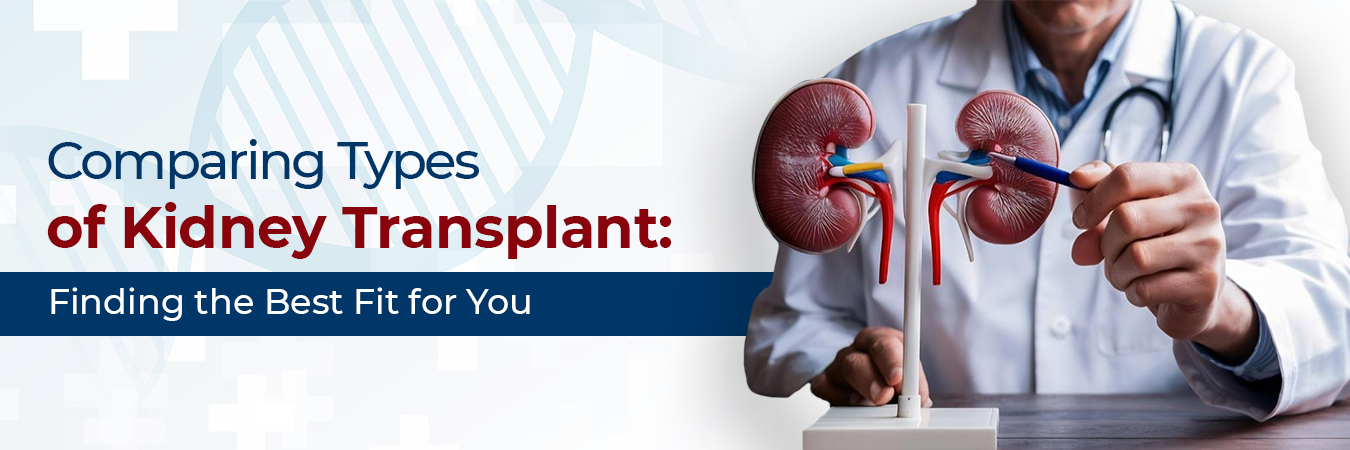For people with end-stage kidney disease, a kidney transplant can be a life-changing option—but did you know that two types of kidneys can be transplanted? There are transplants from a living donor and transplants from a deceased donor, each of which has its pros and cons. Not only is the type of kidney transplant a medical choice, it is a personal choice! In this blog, we are going to define the different types of kidney transplants, compare living and deceased donor transplants side by side, and provide an overview of options to help you think through the type of kidney transplant that may be best suited to your lifestyle, health, and long-term goals. Let’s review options to empower your transplant journey!
Understanding Kidney Transplantation
● What is a kidney transplant?
A kidney transplant is a surgical procedure in which a healthy kidney from a living or deceased donor is placed into a person whose kidneys have failed. The donor kidney filters waste and excess fluid from the blood, which can end the need for dialysis or significantly improve health and quality of life.
● How it helps restore kidney function
A kidney transplant reinstates kidney function by substituting damaged kidneys with functional kidneys that can adequately filter blood and maintain fluid, electrolyte, and waste homeostasis. A transplant is not a temporary measure like dialysis; it provides your body with long-lasting kidney function, restoring many normal, active habits with fewer dietary and fluid restrictions and using less energy.
● Factors to consider before undergoing a transplant
Before one undergoes a kidney transplant, evaluative factors including overall health, age, cause of kidney failure, and compatibility with a donor must be considered. The evaluation process will likely include blood work, imaging, and consultation with specialists. The long list for post-operative care is also a commitment to transplant success; side effects and/or risks of post-operative transplant medications, lifestyle changes, caring for bodily care providing function, etc.
2. Types of Kidney Transplants
● Deceased Donor Kidney Transplant
In this type, the kidney comes from a person who has died recently and is an organ donor. This is the most common form of transplant. Recipients are placed on a waiting list; matching is based on blood type, compatibility of tissue, and urgency for medical needs.
● Living Donor Kidney Transplant
A living donor transplant requires receiving a kidney from a healthy, living person, often a friend or relative. These transplants result in superior outcomes, reduced wait times to transplantation, and are more easily planned. A donor can live a completely healthy life with only one kidney. Surgery is safe for both the living donor and the recipient.
● Preemptive Kidney Transplant
This procedure is done prior to the patient starting dialysis, or preemptively. The results from preemptive transplants are associated with improved outcomes, such as longer graft survival and better quality of life. A preemptive transplant reduces health risks associated with long-term dialysis. The transplant may involve a living or deceased donor, depending on donor availability for the kidney transplant and compatibility requirements at the patient’s center.
● ABO-Incompatible Kidney Transplant
ABO-incompatible transplantation allows patients to receive a kidney from a donor with a different blood type. This is achieved through specialty medical treatment, called plasmapheresis and immunosuppressive treatment, that prevents rejection of an ABO-incompatible graft. While this is a more complex process for the patient, it opens the donor pool and is extremely valuable when there is no compatible donor.
● Paired Kidney Exchange (Swap Transplant)
In a paired kidney exchange, either two or more pairs of a living donor-recipient pair switch kidneys when the original donor is incompatible with their intended recipient. The pairs are then connected to a longer chain of transplants which would hopefully lead to having a compatible match. It is a type of life-saving transplantation that works well through cooperation and using a single nationwide kidney donor registry for donor-recipient matching.
3. Factors to Consider When Choosing a Kidney Transplant Type
When determining the right type of kidney transplant there can be many important considerations. You may consider these factors, including overall health, transplant urgency, availability of a living donor, and the blood and tissue type match. Some may have an advantage over others due to the potential of shorter transplant wait times with a living donor transplant versus needing to use the deceased donor list. Preemptive transplants may ultimately lead to improved long-term outcomes when planning ahead of time. Additionally, the ability to consider advanced options like ABO-incompatible or using a paired exchange program may lead to additional opportunities to receive a transplant. It is extremely important to work with your transplant team in determining the path that would be best for your situation.
4. Recovery and Post-Transplant Care
Recovering from a kidney transplant requires commitment and careful monitoring. Patients typically stay in the hospital for 5 to 10 days to ensure proper kidney function and prevent infections. While energy levels and appetite improve within weeks, full recovery may take several months.
Taking immunosuppressant medications is crucial to prevent rejection, but they also lower immunity, making infection control a priority. Regular check-ups help adjust medications and track kidney health.
A healthy lifestyle plays a key role in long-term success—eating well, staying hydrated, avoiding smoking and alcohol, and maintaining a healthy weight. Once approved by your doctor, exercise can aid recovery.
Emotional support is just as important. Support groups and counseling can provide motivation and reassurance. With proper care, transplant recipients can enjoy a full and healthy life.
5. Conclusion
Deciding on the type of kidney transplant—whether from a living donor, a deceased donor, or a paired exchange—is a deeply personal choice influenced by medical, emotional, and logistical factors. Each option offers the potential for a healthier and improved life.
Proper post-transplant care, including adherence to medications, a healthy lifestyle, and a commitment to long-term well-being, plays a crucial role in recovery. Working closely with your medical team ensures the best possible outcomes.
For expert guidance and care, consult Dr. Nisha Gaur, the Best Nephrologist in Jaipur, who specializes in kidney transplant management and long-term kidney health.


